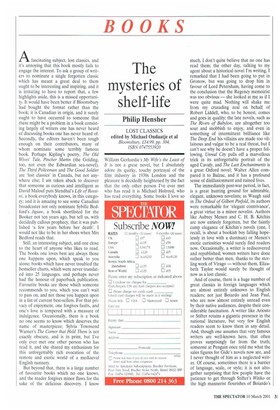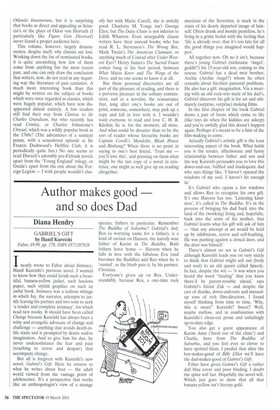The mysteries of shelf-life
Philip Hen s her
LOST CLASSICS edited by Michael Ondaatje et at Bloomsbury, £14.99, pp. 304, ISBN 0747553920
Afascinating subject, lost classics, and it's annoying that this book mostly fails to engage the interest. To ask a group of writers to nominate a single forgotten classic which has meant a great deal to them ought to be interesting and inspiring, and it is irritating to have to report that, a few highlights aside, this is a missed opportunity. It would have been better if Bloomsbury had bought the format rather than the book; it is Canadian in origin, and it surely ought to have occurred to someone that there might be a problem in a book consisting largely of writers one has never heard of discussing books one has never heard of. Secondly, the editors haven't been tough enough on their contributors, many of whom nominate some terribly famous book. Perhaps Kipling's poetry, The Old Wives' Tale, Pincher Martin (the Golding, too, not even the Edwardian sea-novel), The Third Policeman and The Good Soldier are 'lost classics' in Canada, but not anywhere else; I am taken aback to discover that someone as curious and intelligent as David Malouf puts Stendhal's Life of Rossini, a book everybody knows, in this category; and it is amazing to see some Canadian broadcaster not only nominate Sybille Bedford's Jigsaw, a book shortlisted for the Booker not ten years ago, but tell us, with decidedly callous prophecy, that it was published 'a few years before her death'. I would not like to be in her shoes when Mrs Bedford reads that.
Still, an interesting subject, and one close to the heart of anyone who likes to read. The books one loves best are always those one happens upon, which speak to you alone; books which have never troubled the bestseller charts, which were never translated into 25 languages, and perhaps never had the honour of paperback publication. Favourite books are those which someone recommends to you, which you can't wait to pass on, and not those you happen upon in a list of current best-sellers. For that privacy of enjoyment, one forgives faults, and one's love is tempered with a measure of indulgence. Occasionally, there is a book no one seems to know which deserves the name of masterpiece; Sylvia Townsend Warner's The Corner that Held Them is not exactly obscure, and is in print, but I've only ever met one other person who has read it, and she shared my enthusiasm for this unforgettably rich evocation of the remote and exotic world of a mediaeval English nunnery.
But beyond that, there is a large number of favourite books which no one knows, and the reader forgives minor flaws for the sake of the delicious discovery. I know William Gerhardie's My Wife's the Least of It is not a great novel, but I absolutely adore its quirky, touchy portrayal of the film industry in 1930s London and the pleasure is decidedly heightened by the fact that the only other person I've ever met who has read it is Michael Holroyd, who has read everything. Some books I love so
much, I don't quite believe that no one has read them; the other day, talking to my agent about a historical novel I'm writing, I remarked that I had been going to put in Gronow, but was going to drop him in favour of Lord Petersham, having come to the conclusion that the Regency memoirist was too obvious — she looked at me as if I were quite mad. Nothing will shake me from my crusading zeal on behalf of Robert Liddell, who, to be honest, comes and goes in quality; the late novels, such as The Rivers of Babylon, are altogether too sour and snobbish to enjoy, and even in something of intermittent brilliance like The Deep End his villains are made too villainous and vulgar to be a real threat, but I can't see why he doesn't have a proper following. Unreal City pulls off a marvellous trick in its unforgettable portrait of the aged Cavafy, and The Last Enchantments is a great Oxford novel; Walter Allen compared it to Balzac, and it has a profound sense of disillusionment and ruined lives.
The immediately post-war period, in fact, is a great hunting ground for admirable, elegant, unknown novelists; as Waugh said in The Ordeal of Gilbert Pinfold, its authors were remarkable for 'elegant contrivance', a great virtue in a minor novelist. Authors like Aubrey Menen and C. H. B. Kitchin are now entirely forgotten, but the faintly camp elegance of Kitehin's novels (one, I recall, is about a bookish boy falling hopelessly in love with a dustman) or Menen's exotic curiosities would surely find readers now. Occasionally, a writer is rediscovered and republished; women writers have done rather better than men, thanks to the sterling work of Virago — without them, Elizabeth Taylor would surely be thought of now as a lost classic.
And of course, there is a huge number of great classics in foreign languages which are almost entirely unknown to English readers; not just Boiardo and Jean Paul, who are now almost entirely unread even by their native audiences, despite their considerable fascination. A writer like Ariosto or Stifter retains a gigantic presence in the national literature, but very few English readers seem to know them in any detail. And, though one assumes that very famous writers are well-known here, that often proves surprisingly far from the truth; someone at Penguin once told me what the sales figures for Gide's novels now are, and I never thought of him as a neglected writer. Of course, sometimes there is a barrier of language, scale, or style; it is not altogether surprising that few people have the patience to get through Stifter's Witiko or the high mannerist flourishes of Boiardo's Orlando Innamorato, but it is surprising that books as direct and appealing as Sciascia's or the plays of Odon von Horvath (I particularly like Figaro Gets Divorced) never found a proper audience here.
This volume, however, largely demonstrates, despite itself, why classics are lost. Working down the list of nominated books, it is quite astonishing how few of them come from anything but the most recent past, and one can only draw the conclusion that writers, now, do not read in any inquiring way the literature of past centuries. A much more interesting book than this might be written on the subject of books which were once regarded as classics, which were hugely popular, which have now disappeared almost entirely. A few readers still find their way from Clarissa to Sir Charles Grandison, but who recently has read Cowley, or Charles Johnstone's Chtysal, which was a wildly popular book in the 1760s? (The adventures of a sentient penny, with a sensational episode at Sir Francis Dashwood's Hellfire Club, it is periodically quite fun.) No one seems to read Disraeli's adorably pre-Firbank novels apart from the 'Young England' trilogy, or Ouida's apart from the one about the Foreign Legion — I wish people wouldn't clas
sify her with Marie Corelli, she is awfully good. Charlotte M. Yonge isn't George Eliot, but The Daisy Chain is not inferior to Edith Wharton. Even unarguably classic writers have their unread books; who has read R. L. Stevenson's The Wrong Box, Mark Twain's The American Claimant, or anything much of Conrad after Under Western Eyes? Henry James's The Sacred Fount comes bang in his best period, between What Maisie Knew and The Wings of the Dove, and no one seems to know it at all.
But these personal discoveries are all part of the pleasure of reading, and there is a perverse pleasure in the solitary communion; and as a novelist, the reassurance that, long after one's books are out of print, someone, somewhere, may pick up a copy and fall in love with it. I wouldn't want everyone to read and love C. H. B. Kitchin; he is, for the moment, all mine. And what could be drearier than to be the sort of reader whose favourite books are Captain CoreIli's Mandolin, Bleak House and Birdsong? When there is no point in saying to one's best friend, 'Trust me — you'll love this', and pressing on them what might be the last copy of a novel in existence, one might as well give up on reading altogether.



































































 Previous page
Previous page